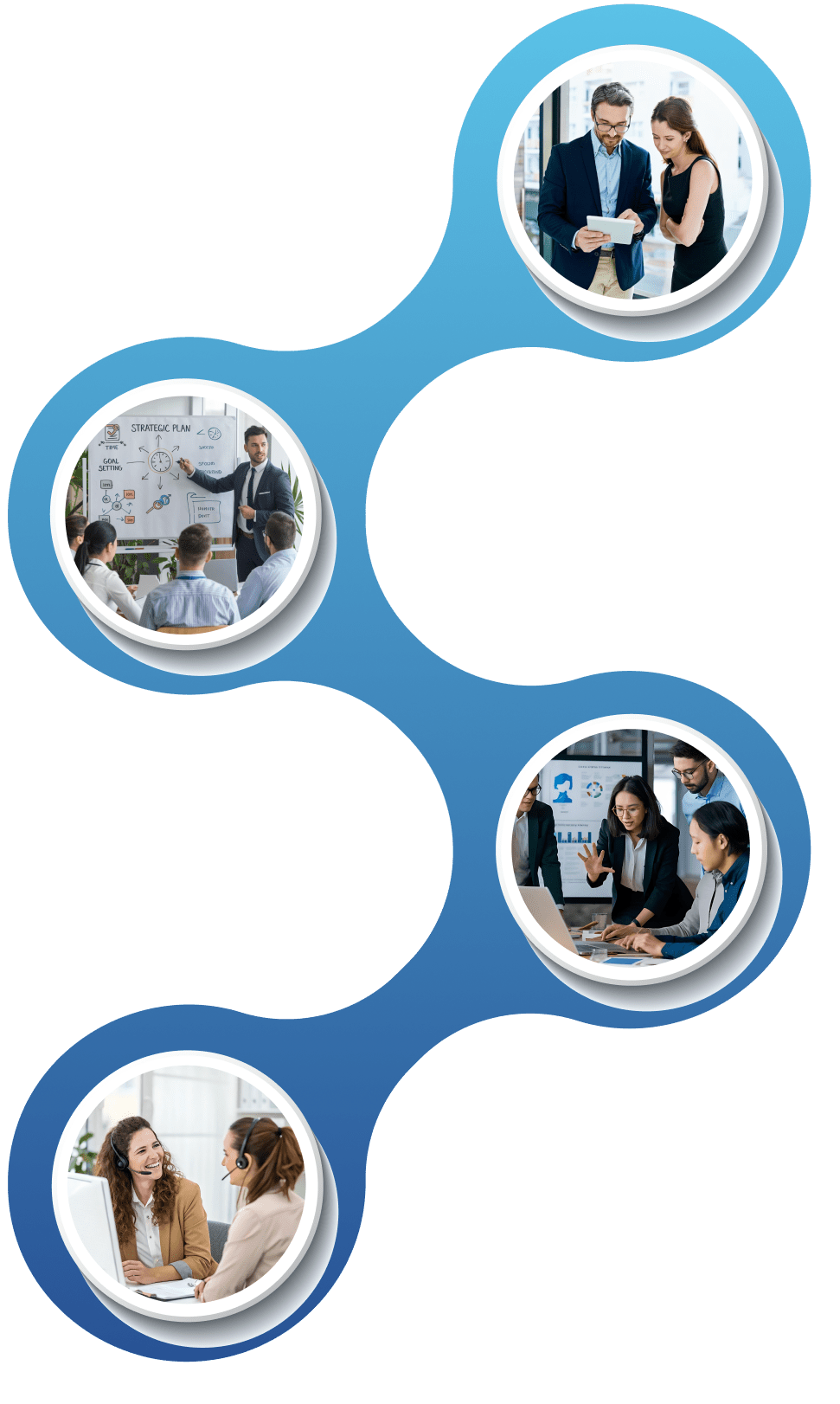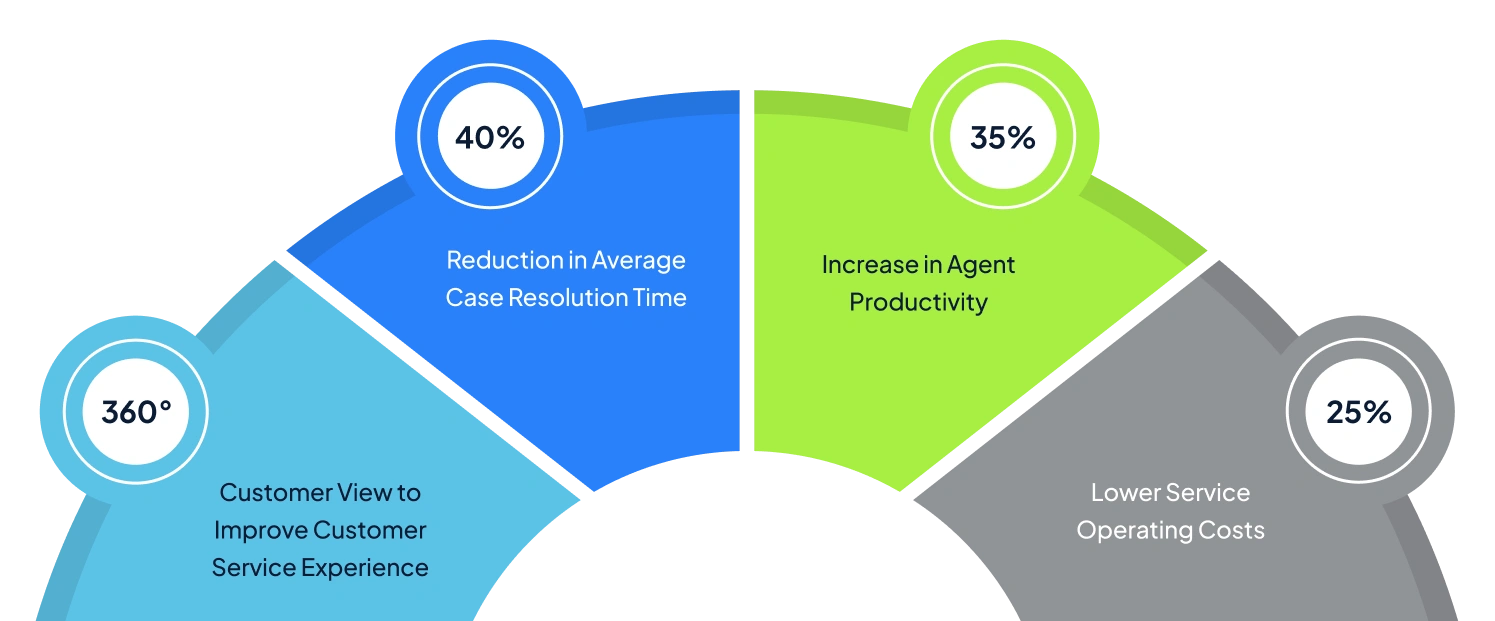The Best
Customer Service
Improvement Strategies
Streamline operations, reduce costs, and elevate your customer experience with customer service improvement strategies by VALiNTRY360.
Talk to a Customer Service Strategist

Customer Service Improvement Strategies
Customers expect seamless, responsive service interactions through every channel, anticipate rapid resolution of their issues, and demand agents who understand their complete history without repetition. Yet customer service teams struggle with disconnected systems, incomplete customer data, and increasing ticket volumes paired with limited resources. This operational reality prevents them from delivering the personalized, efficient service experiences customers require.
The solution lies in customer service technologies that unify customer data across touchpoints, automate routine tasks, and provide AI-enhanced decision support at critical moments. This strategic approach enables support teams to deliver personalized, efficient resolution regardless of channel or complexity, transforming service operations from cost centers into revenue generation and customer engagement hubs that build strong customer loyalty. Yet, achieving this goal requires expert guidance tailored to your organization's unique service challenges and operational objectives.
Connect with Our Customer Service ExpertsAre You Facing Customer Service Challenges Like These?
Many businesses hit roadblocks when trying to launch community portals or deliver seamless digital experiences.
At VALiNTRY360, we remove those obstacles ensuring your Salesforce Experience Cloud is set up to drive real results for your business.


Rising Customer Service Expectations
Modern customers demand immediate resolution regardless of channel. According to Salesforce research, 88% of service professionals report that customer expectations are higher than ever before, while 82% say customers ask for more from companies than they used to.


Handling Complex and Difficult Interactions
Service teams frequently manage difficult customer situations requiring specialized skills. The Customer Experience Impact Report reveals that 89% of consumers have switched to a competitor following a poor customer service experience, highlighting the critical importance of effectively managing emotionally charged interactions.


Managing Multiple Simultaneous Inquiries
Agents struggle with increasing inquiry volume across multiple channels. Service representatives managing concurrent requests without proper tools experience 47% higher error rates and 38% lower customer satisfaction scores compared to teams with integrated multichannel platforms.


Consistently Communicating Across Multiple Channels
Providing unified experiences across phone, email, chat, and social media presents significant challenges. Organizations with disjointed communication channels experience 36% higher customer churn rates and 42% more repeat contacts as customers seek consistent resolution.


Slow Response Times
Customer patience continues to diminish, with 83% of customers expecting to interact with someone immediately when contacting a company, while 60% define "immediate" as 10 minutes or less for customer service responses.


Disconnected Customer Data
Service teams struggle with fragmented data across systems. According to Salesforce research, 26% of service representatives report they often lack context about a customer's situation, while 80% believe better access to other departments' data would improve their work.


Delivering Personalized Service Experiences
Generic service approaches fail to meet individual customer needs. Research shows 79% of customers are willing to share relevant information about themselves in exchange for contextualized interactions where they're immediately known and understood.


Inefficient Service Processes
Agents waste valuable time switching between multiple systems. Administrative tasks consume 30% of an average service professional's working hours, leaving only 29% of their time for delivering service to customers.


Limited Self-Service Options
Customers prefer solving simple issues themselves, but many organizations lack effective self-service tools. Implementation of AI-powered self-service options can reduce call, chat and email volume by up to 40%, while improving customer satisfaction scores by 15%.


High Talent Turnover
Organizations implementing comprehensive service platforms report 29% higher agent satisfaction and 24% lower turnover by reducing repetitive tasks and providing tools that enable success. The share of service agents who report having a clear path for career growth has increased to 85% in organizations that invest in their service technology.
Why Choose  for Customer Service Improvement Strategies?
for Customer Service Improvement Strategies?

Certified Salesforce Service Cloud Experts
- Our team of certified Salesforce consultants delivers proven customer service improvement strategies across industries, helping clients achieve significant enhancements in customer satisfaction scores and operational efficiency.

Proven Service Cloud Implementation Track list
- With successful implementations across multiple industries, we stand as one of the most trusted Salesforce Service Cloud partners, helping clients implement ways to improve customer service that deliver results like 37% reduction in case resolution time and 42% improvement in first contact resolution rates.

Tailored Customer Service Improvement Solutions
- We architect custom service solutions that address your specific challenges, backed by the comprehensive expertise of a, experienced, certified, Salesforce-Branded Service Partner with exceptional client retention rates. Our customer service improvement plans focus on your unique operational goals and service requirements.
Our Customer Service Improvement Offerings
- Service Maturity Assessment: Evaluate current service capabilities and identify opportunities for improving customer service operations
- Customer Service Improvement Plan Development: Create strategic service enhancement roadmaps aligned to customer experience goals
- Technology Alignment: Ensure platform integration across service, sales and marketing systems to improve the quality of customer service
- Case Management Automation: Streamline case handling with proven workflows that reduce resolution time by 30%
- Knowledge Base Implementation: Deploy searchable solutions that empower both agents and customers, a key tool for improving customer service
- Customer Service Experience Mapping: Optimize touchpoints for frictionless interactions and improved customer service quality
- AI-Powered Service Tools: Implement new technology to improve customer service through predictive insights and smart recommendations
- Cross-Cloud Integration: Connect Service Cloud with Sales Cloud and Marketing Cloud for unified customer view
- Third-Party System Connection: Integrate telephony, chat platforms and field service tools via APIs
- Legacy System Migration: Transition from outdated ticketing systems to modern Service Cloud architecture
- Service Performance Monitoring: Track KPIs and generate automated reporting dashboards
- Process Refinement: Implement A/B testing that drives 29% improvement in customer satisfaction scores
- Agent Enablement: Provide training that accelerates adoption and service excellence
Technical Expertise and Platform Architecture
Our Salesforce Service Cloud team specializes in enterprise service platforms that scale efficiently. Companies implementing strategic customer service improvement tools report 32% faster case resolution times and 28% improvement in agent productivity according to Salesforce’s Customer Success Metrics report.
Our integration capabilities connect service systems with other customer touchpoints for seamless experiences, delivering proven strategies to improve customer service quality that result in 37% higher customer retention rates when combining automated workflows with integrated omnichannel capabilities.
Our Proven Approach
We follow a structured, four-step methodology designed to maximize Salesforce success. From initial discovery to long-term support, our process ensures alignment with your business goals, seamless execution, and continuous optimization for sustainable growth.

Step 1: Discovery and Assessment
- Comprehensive analysis of current service processes and metrics
- Documentation of customer experience pain points and opportunities
- Service technology infrastructure evaluation
Step 2: Solution Design and Roadmap
- Service Cloud architecture planning with scalability considerations
- Custom workflow and automation blueprint development
- Knowledge management and self-service strategy creation
Step 3: Implementation and Integration
- Accelerated platform configuration and deployment
- Seamless integration with communication channels and business systems
- Thorough testing and quality validation
Step 4: Enablement and Continuous Improvement
- Agent and administrator training programs
- Service process optimization and analytics configuration
- Regular performance reviews with enhancement recommendations
Key Benefits of VALiNTRY360’s Customer Service Improvements
Organizations using these AI sales tools see dramatic improvements that transform their business:


Industries We Serve
VALiNTRY360 accelerates business performance through specialized digital transformation solutions across multiple industries:

Healthcare
Streamline patient support operations with HIPAA-compliant service tools that protect sensitive information. Our customer service improvement strategies enable personalized care coordination through comprehensive patient history access and proactive follow-up automation, enhancing both patient satisfaction and operational efficiency.

High Tech
Implement sophisticated support tiers with intelligent case routing based on product complexity and customer segment. Our service improvement methodologies help technology companies resolve technical issues faster while capturing critical product feedback to inform development roadmaps and reduce future support volume.

Professional Services
Establish client-centric service operations that align with billable project work and relationship management. Customer service improvement tools connect client engagements with service interactions, providing comprehensive visibility that strengthens professional relationships and increases retention rates.

Manufacturing
Deploy field service management tools that connect technicians with office support staff for seamless issue resolution. Service Cloud integrates with inventory systems to verify parts availability and automatically schedules follow-up visits based on case complexity, improving customer service operations throughout the service lifecycle.

Retail & Consumer Goods
Create omnichannel service capabilities that unify in-store, online, and post-purchase support experiences. Dynamic knowledge recommendations provide agents with product information and return procedures that ensure consistent service quality regardless of customer contact method, driving higher satisfaction and repeat purchases.

Financial Services & Private Equity
Automate case classification and routing for financial inquiries while providing agents with complete customer relationship data. Service Cloud creates intelligent workflows that guide representatives through complex problem resolution while maintaining compliance with industry regulations, dramatically improving customer service quality for financial institutions.

Real Estate
Coordinate property management service requests with tenant communication through unified workflows. Automated follow-up processes ensure timely resolution tracking while custom dashboards provide property managers with comprehensive service metrics that improve tenant satisfaction and retention.

Hospitality & Travel
Design responsive guest service systems that connect pre-arrival, on-property, and post-stay experiences. Sophisticated preference tracking enables personalized service recovery and proactive issue resolution, transforming potential service failures into opportunities to improve customer service and build loyalty.

Insurance
Implement claim-centered service processes that streamline policyholder communications during critical moments. Automated documentation collection and status updates improve transparency while integrated knowledge resources help agents navigate complex policy questions, reducing resolution time and improving policyholder satisfaction.
Get Started with 
Partner with trusted service improvement experts who deliver:
Expert Consultation
Meet with certified Service Cloud specialists who understand your industry
Custom Implementation Blueprint
Receive a tailored service transformation roadmap
Rapid Deployment
Launch service solutions that improve customer satisfaction and efficiency.

Smarter Engagement, Bigger Results
As a leading Customer Service Improvement service provider in the USA, VALiNTRY360 delivers comprehensive solutions that help businesses compete in rapidly changing markets. With our expert Customer Service, consulting services, we work closely with your team to implement customized strategies that drive measurable business results.
The Best Customer Service Improvement Service Providers FAQ by 
Improving customer service requires a comprehensive approach that combines technology, training, and strategic processes. Organizations should:
- Develop a customer-centric culture that prioritizes service excellence at every level
- Implement unified customer service technologies that provide a complete view of customer interactions
- Establish clear service standards with measurable KPIs to track improvement
- Invest in continuous training for service representatives to enhance skills and knowledge
- Create proactive service protocols that anticipate and address customer needs
- Regularly collect and analyze customer feedback to identify improvement opportunities
According to Salesforce research, 88% of service professionals report that customer expectations are higher than ever before. Companies that implement comprehensive customer service improvement strategies see an average 30% increase in customer satisfaction scores.
Improving service quality requires attention to both operational efficiency and customer experience factors:
- Establish quality benchmarks based on industry standards and customer expectations
- Implement quality monitoring programs with regular service interaction reviews
- Develop robust knowledge management systems to ensure consistent service delivery
- Create personalized service experiences based on customer preferences and history
- Optimize service processes to reduce friction and resolution time
- Implement continuous improvement methodologies like Six Sigma or Lean for service operations
Organizations using structured quality improvement methodologies report 25% lower service operating costs while delivering higher customer satisfaction ratings.
Customer feedback provides invaluable insights for service improvement when systematically collected and analyzed:
Structured Feedback Collection Methods:
- Post-interaction surveys with specific service quality questions
- Regular Net Promoter Score (NPS) measurement
- Customer satisfaction (CSAT) tracking after service interactions
- Social media sentiment analysis
- Focus groups for in-depth experience understanding
Effective Implementation Process:
- Establish feedback collection mechanisms across all service channels
- Implement real-time analytics to identify patterns and trends
- Create cross-functional improvement teams to address systemic issues
- Develop action plans with specific improvement initiatives
- Close the feedback loop by communicating changes to customers
Modern service technology transforms customer support operations through multiple capabilities:
Operational Enhancements:
- Unified customer data platforms eliminate information silos
- Automated workflow management reduces manual processing
- Intelligent routing directs inquiries to the most qualified agents
- Real-time dashboards provide visibility into service performance
- Integration between systems ensures consistent customer experiences
Service technology delivers these improvements by providing agents with comprehensive customer information, automating routine tasks, and enabling data-driven decision-making at both operational and strategic levels.
Generative AI represents a transformative technology for service operations, offering capabilities that enhance both agent efficiency and customer experience:
Strategic Applications:
- Intelligent Knowledge Recommendations – AI suggests relevant articles and solutions based on case context
- Automated Response Generation – Creates personalized, contextually appropriate responses for agent review
- Conversation Summarization – Provides real-time case summaries to reduce administrative burden
- Predictive Issue Resolution – Anticipates customer needs based on behavioral patterns
- Personalization at Scale – Delivers customized experiences without proportional staffing increases
According to recent research, service organizations implementing AI technologies report 83% of decision makers planning to increase investments in automation. Implementation typically delivers 35% reduction in administrative tasks and 40% improvement in case handling efficiency.
Chatbots and virtual assistants have evolved into sophisticated service tools that enhance customer experience while reducing operational costs:
Customer Benefits:
- 24/7 availability for immediate assistance
- Consistent responses to common inquiries
- Personalized interactions based on customer history
- Seamless escalation to human agents when needed
- Proactive support notifications and updates
Organizations implementing AI-powered chatbots report that self-service capabilities can reduce call, chat, and email volume by up to 40% while improving customer satisfaction scores by 15% through instant resolution of common issues.
Customer Relationship Management (CRM) platforms transform service delivery by creating a unified foundation for customer interactions:
Core Service Capabilities:
- Centralized customer data accessible across departments
- Complete interaction history for contextual service delivery
- Automated workflow management for consistent process execution
- Integrated knowledge resources for faster issue resolution
- Real-time analytics for performance optimization
Studies show that organizations implementing integrated CRM solutions for service management achieve:
- 37% higher customer retention rates
- 42% improvement in first contact resolution
- 28% increase in agent productivity
- 25% reduction in service operating costs
- 30% higher customer satisfaction scores
The most significant CRM impact comes from eliminating information silos, with 80% of service representatives reporting that better access to cross-departmental data would substantially improve their ability to serve customers effectively.
Healthcare service improvement requires balancing clinical excellence with exceptional patient experience:
Healthcare-Specific Strategies:
- Implement HIPAA-compliant service platforms that protect patient information
- Create unified patient profiles that connect clinical and administrative data
- Establish proactive communication protocols for appointment reminders and follow-ups
- Develop specialized knowledge resources for common patient inquiries
- Design patient-centered workflows that reduce administrative burden
Healthcare organizations implementing comprehensive service improvement strategies report 34% higher patient satisfaction scores and 28% reduction in administrative costs.
Financial institutions face unique service challenges that require specialized improvement approaches:
Key Financial Service Strategies:
- Implement secure, compliant service platforms that protect sensitive financial data
- Develop omnichannel capabilities that connect branch, phone, and digital experiences
- Create intelligent authentication systems that balance security and convenience
- Establish specialized service teams for different account types and complexity levels
- Design proactive notification systems for account changes and important updates
The most successful financial service organizations leverage technology to provide personalized service while maintaining the highest security and compliance standards.
Delivering exceptional ecommerce customer service requires a strategic blend of technology, process optimization, and personalized engagement that addresses the unique challenges of digital retail environments.
Strategic Ecommerce Service Improvements:
- Implement unified messaging platforms that maintain context across email, chat, social, and phone channels
- Deploy AI-powered knowledge bases with intuitive search and visual tutorials for 24/7 self-service
- Create customized post-purchase communication sequences based on product type and customer behavior
- Develop automated anomaly detection for proactive order issue identification and resolution
- Establish digital-first service metrics with journey stage benchmarks and friction point analytics
- Implement streamlined return and exchange processes with minimal customer effort requirements
Ecommerce organizations implementing comprehensive service improvement strategies report 38% higher repeat purchase rates and 42% increase in average customer lifetime value compared to competitors with fragmented service approaches.
Restaurant service excellence requires seamless coordination between front-of-house experiences and operational systems, creating memorable dining interactions that transform first-time visitors into loyal advocates.
Strategic Restaurant Service Improvements:
- Implement structured guest recognition protocols with preference tracking across visits
- Deploy integrated POS and kitchen management systems that reduce order errors and timing issues
- Create standardized service recovery workflows with tiered compensation guidelines
- Develop comprehensive staff training programs combining technical processes and hospitality skills
- Establish regular taste testing sessions to ensure complete menu knowledge among service staff
- Implement digital feedback collection with real-time alerts for immediate service recovery opportunities
Restaurants implementing comprehensive service improvement strategies report 32% higher repeat visit rates and 28% increase in per-guest average spending, demonstrating the direct revenue impact of service excellence.
Strategic Retail Service Improvements:
- Deploy mobile customer data tools providing associates with complete customer purchase history and preferences
- Implement unified inventory visibility systems across physical locations and digital platforms
- Create seamless buy-online-pickup-in-store (BOPIS) workflows with automated notifications
- Develop consistent cross-channel return and exchange policies with minimal documentation requirements
- Establish tiered service recovery protocols with appropriate associate empowerment levels
- Implement regular micro-training sessions focused on high-value product knowledge and service scenarios
Leading retail organizations implementing comprehensive service improvement strategies report 38% higher customer retention rates and 42% increase in average transaction value, demonstrating the direct revenue impact of service excellence investments.
Transforming IT service delivery requires balancing technical excellence with exceptional user experience, creating support interactions that enhance productivity while building confidence in technology resources.
Strategic IT Service Improvements:
- Implement multi-channel support options with intelligent routing based on issue complexity and user profiles
- Deploy intuitive self-service knowledge resources with natural language search capabilities
- Create standardized resolution protocols for common technical issues with automated diagnostic tools
- Establish transparent SLAs with real-time tracking and proactive communication at key milestones
- Develop preventive maintenance and monitoring systems that identify potential issues before users are impacted
- Implement continuous knowledge sharing mechanisms between support teams and development resources
Organizations implementing comprehensive IT service improvement strategies report 45% higher employee productivity during technology transitions and 35% reduction in shadow IT usage, demonstrating the business impact of exceptional technical support.
Airline service excellence requires orchestrating complex operational systems while delivering personalized experiences during high-stress travel situations that often involve disruption management.
Strategic Airline Service Improvements:
- Implement proactive communication systems for schedule changes with personalized rebooking options
- Deploy mobile service platforms providing frontline staff with complete passenger information and status
- Create decision-making frameworks that empower agents to resolve issues without escalation delays
- Develop tiered recognition programs for loyalty members with tangible benefits during service interactions
- Establish comprehensive disruption management protocols with automated recovery workflows
- Implement seamless integration between digital self-service tools and agent-assisted channels
Airlines implementing comprehensive service improvement strategies report 32% higher passenger retention rates and 28% increase in ancillary revenue opportunities, demonstrating the direct financial impact of exceptional travel experiences.
Hotel service excellence requires creating memorable guest experiences through a strategic combination of personalization, operational efficiency, and consistent service delivery across every property touchpoint.
Strategic Hotel Service Improvements:
- Implement unified guest profiles with preference tracking and stay history across departments
- Deploy integrated property management systems connecting reservations, housekeeping, and concierge services
- Create personalized arrival and in-stay experiences based on guest history and trip purpose
- Develop tiered service recovery protocols with appropriate compensation guidelines and authorization levels
- Establish preventive maintenance programs that minimize guest disruption and quality issues
- Implement systematic training programs that balance technical skills with genuine hospitality
Hospitality organizations implementing comprehensive service improvement strategies report 42% higher RevPAR (Revenue Per Available Room) and 38% improvement in online review ratings, demonstrating the direct revenue impact of exceptional guest experiences.
Manufacturing service excellence requires orchestrating complex technical support, parts management, and field operations while maintaining production continuity and minimizing costly equipment downtime for customers.
Strategic Manufacturing Service Improvements:
- Implement integrated service platforms connecting field technicians with engineering and parts inventory systems
- Deploy IoT-enabled predictive maintenance capabilities that identify potential failures before they impact operations
- Create comprehensive digital product documentation with interactive troubleshooting guides and video tutorials
- Establish specialized technical support tiers based on product complexity and customer production criticality
- Develop transparent SLAs with real-time status tracking throughout the service lifecycle
- Implement cross-functional escalation protocols that mobilize appropriate resources for emergency situations
Manufacturing organizations implementing comprehensive service improvement strategies report 47% reduction in mean-time-to-resolution for critical issues and 39% decrease in unplanned equipment downtime, directly impacting customer productivity and operational excellence metrics.
Real estate service transformation requires coordinating property management operations, transaction communications, and maintenance services while creating seamless experiences for tenants, buyers, sellers, and property owners.
Strategic Real Estate Service Improvements:
- Implement unified property management platforms integrating tenant communication, maintenance requests, and financial operations
- Deploy mobile-optimized inspection and documentation tools that accelerate response to property issues
- Create transparent transaction management systems with automated milestone notifications for all stakeholders
- Establish comprehensive knowledge bases covering property specifications, regulatory requirements, and neighborhood information
- Develop tiered service response protocols based on issue severity and property classification
- Implement predictive maintenance programs that identify potential property issues before they impact tenants
Real estate organizations implementing comprehensive service improvement strategies report 43% higher tenant retention rates and 36% reduction in vacancy duration, demonstrating the direct revenue impact of exceptional property management experiences.
Insurance service excellence requires balancing empathetic human interaction during high-stakes moments with efficient claims processing and policy management, creating experiences that transform administrative transactions into relationship-building opportunities.
Strategic Insurance Service Improvements:
- Implement omnichannel claims reporting capabilities with seamless transitions between digital and agent-assisted channels
- Deploy intelligent document processing systems that extract and validate information from submitted forms and evidence
- Create personalized policyholder portals with comprehensive coverage details and intuitive self-service tools
- Establish catastrophe response protocols with specialized teams and expedited processing workflows
- Develop proactive communication systems that notify customers of claim status changes and required actions
- Implement analytics-driven insights that identify potential coverage gaps and prevention opportunities
Insurance organizations implementing comprehensive service improvement strategies report 41% higher policy renewal rates and 32% increase in cross-product adoption, demonstrating the direct financial impact of exceptional customer service during both routine interactions and moments of truth.
Contact center excellence requires a combination of technology, process optimization, and agent empowerment:
Strategic Contact Center Improvements:
- Implement intelligent routing that matches customers with appropriate agents
- Develop comprehensive knowledge resources for faster issue resolution
- Create real-time coaching systems that provide in-call guidance
- Establish performance analytics with actionable improvement metrics
- Design quality monitoring programs that focus on both efficiency and experience
Organizations implementing AI-powered contact center tools report that administrative tasks can be reduced by 35%, allowing agents to focus more time on actual customer service delivery.
Digital service excellence requires seamless experiences across web, mobile, and social touchpoints:
Digital Service Enhancement Framework:
- Implement omnichannel platforms that maintain context across digital touchpoints
- Create robust self-service capabilities with comprehensive knowledge resources
- Develop asynchronous messaging options for convenient customer communication
- Establish AI-powered chatbots for immediate response to common inquiries
- Design proactive outreach systems based on digital behavior patterns
Research shows that 91% of consumers are more likely to shop with brands that recognize, remember, and provide relevant recommendations – making personalized digital service a competitive necessity.
Creating a comprehensive service improvement strategy requires a structured approach:
Strategic Planning Framework:
- Assessment Phase:
- Analyze current service performance across channels
- Benchmark against industry standards and competitors
- Identify critical improvement opportunities with highest impact
- Document customer journey pain points and friction areas
- Planning Phase:
- Define specific improvement objectives with measurable targets
- Develop technology requirements and integration roadmap
- Create process enhancement specifications for key service workflows
- Establish training requirements for service personnel
- Implementation Phase:
- Deploy technology solutions with phased approach
- Implement process improvements with change management support
- Conduct comprehensive training for all service stakeholders
- Establish measurement systems for performance tracking
- Optimization Phase:
- Monitor key performance indicators against targets
- Collect ongoing customer and employee feedback
- Make iterative improvements based on operational data
- Scale successful initiatives across the organization
Organizations that follow structured improvement methodologies report 37% higher success rates and 42% better ROI on service transformation initiatives.
Sustainable service excellence requires ongoing improvement systems rather than one-time initiatives:
Continuous Improvement Methodology:
- Implement regular service performance review cadences
- Establish cross-functional improvement teams with clear ownership
- Create systematic feedback collection from customers and employees
- Develop innovation pipelines for service enhancement ideas
- Design agile implementation processes for rapid testing and deployment
Organizational Framework Components:
- Executive sponsorship with clear service excellence mandates
- Dedicated resources for improvement initiative management
- Technology platforms that enable data-driven decision making
- Recognition programs that reward service innovation
- Knowledge sharing systems for best practice distribution
Companies with established continuous improvement processes for customer service report 29% higher agent satisfaction rates and 24% lower turnover – creating a foundation for consistent service excellence.
Customer service excellence delivers measurable business impact across multiple dimensions:
Financial Performance Impacts:
- 37% higher customer retention rates
- 28% increase in customer lifetime value
- 32% improvement in cross-selling effectiveness
- 25% reduction in service delivery costs
- 22% higher new customer acquisition through referrals
Operational Performance Benefits:
- 35% increase in first contact resolution rates
- 42% reduction in escalation frequency
- 29% improvement in service consistency
- 33% higher employee satisfaction scores
- 26% reduction in training costs through improved knowledge systems
Strategic Competitive Advantages:
- Enhanced brand reputation for service excellence
- Improved customer intelligence through service interactions
- Increased ability to recover from service failures
- Greater resilience during market disruptions
- Stronger foundation for premium pricing strategies
- Research consistently demonstrates that organizations ranked in the top quartile for customer service excellence outperform competitors by 80% in revenue growth metrics.
Implementing service technology effectively requires attention to multiple dimensions beyond the platform itself:
Critical Success Factors:
- Comprehensive Requirements Analysis – Detailed documentation of service processes and integration points
- Change Management Strategy – Systematic approach to organizational transition
- Phased Implementation Plan – Logical sequence with measurable milestones
- Integration Architecture – Clear specifications for data flow between systems
- Training Curriculum Development – Role-specific learning paths with measurable objectives
- Performance Measurement Framework – KPIs aligned with business outcomes
Implementation Approach:
- Discovery Phase – Document current state processes and pain points
- Solution Design – Create future state architecture and workflows
- Deployment Planning – Develop detailed implementation roadmap
- System Configuration – Implement platform capabilities aligned with requirements
- Validation Testing – Verify functionality against specifications
- Knowledge Transfer – Ensure organizational readiness for adoption
- Continuous Optimization – Measure performance and refine configuration
Organizations that follow structured implementation methodologies report 42% higher satisfaction with technology outcomes and 35% better ROI compared to those with informal approaches.
AI and automation technologies enhance agent performance through multiple capabilities:
Agent Empowerment Tools:
- Intelligent Knowledge Recommendations – Contextual article suggestions based on case details
- Real-Time Guidance – In-conversation coaching for optimal customer interactions
- Automated Administrative Tasks – Elimination of manual documentation requirements
- Predictive Analytics – Next-best-action recommendations based on customer profiles
- Sentiment Analysis – Real-time emotional intelligence for conversation management
Performance Impact:
- 35% reduction in average handle time
- 42% improvement in first-contact resolution rates
- 28% higher customer satisfaction scores
- 33% increase in agent confidence levels
- 24% reduction in training time for new agents
Service organizations implementing AI-powered agent assistance report that administrative tasks can be reduced by 35%, allowing representatives to focus more time on actual customer interaction and problem-solving.
SMBs can achieve significant service improvements through right-sized technology implementations:
SMB-Focused Implementation Strategy:
- Start with cloud-based platforms that minimize infrastructure requirements
- Implement modular solutions that allow phased adoption based on priorities
- Focus on high-impact capabilities that deliver immediate operational benefits
- Leverage pre-configured templates to accelerate time-to-value
- Utilize managed services to supplement limited internal IT resources
Staged Implementation Approach:
- Begin with core case management capabilities
- Add knowledge management functionality for consistency
- Implement customer communication channels based on volume
- Integrate with existing business systems incrementally
- Add advanced capabilities like AI and analytics as operations mature
Small and medium businesses implementing service technology in this manner report achieving 80% of the benefits of enterprise implementations at approximately 40% of the cost, with 60% faster time-to-value metrics.
Measuring service technology ROI requires evaluation across multiple dimensions:
Financial Metrics:
- Cost per service interaction
- Service operating expenses as percentage of revenue
- Average revenue per customer
- Customer lifetime value changes
- Service staff productivity improvements
Operational Metrics:
- First contact resolution rates
- Average resolution time
- Service level agreement compliance
- Inquiry volume by channel
- Agent utilization rates
Customer Experience Metrics:
- Customer satisfaction scores (CSAT)
- Net Promoter Score (NPS) trends
- Customer effort scores
- Retention and churn rates
- Positive social media sentiment
Organizations implementing comprehensive measurement frameworks report 58% higher likelihood of achieving projected ROI targets and 37% greater ability to secure additional investment for service initiatives.
VALiNTRY360 delivers superior customer service improvement outcomes through our distinctive methodology:
Differentiating Capabilities:
- Extensive Implementation Expertise – Certified professionals with extensive industry experience
- Comprehensive Process Analysis – Detailed assessment of current service operations
- Strategic Roadmap Development – Customized improvement plans aligned to business objectives
- Integration Architecture Excellence – Seamless connection between service platforms and business systems
- Change Management Leadership – Systematic approach to organizational adoption
- Continuous Optimization Framework – Ongoing performance improvement methodology
As a Salesforce-Branded Services Partner, VALiNTRY360 combines platform expertise with customer service improvement methodologies that deliver measurable business impact.

 for Customer Service Improvement Strategies?
for Customer Service Improvement Strategies?
